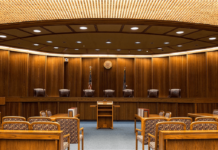The Kansas Legislature has handed Attorney General Kris Kobach oversight of local governments that bring class-action lawsuits similar to litigation seeking damages resulting from vaping, opioid abuse and climate change.
The House on Thursday voted 73-52 to pass a bill requiring the attorney general to approve any contingency fee contracts for legal services entered into by local governments. It was approved 28-12 in the Senate on Wednesday. It now goes to the governor.
The bill is similar to one that former Attorney General Derek Schmidt backed in 2020 that would have limited local governments from bringing lawsuits based on contingency-fee arrangements.
The new bill bars local governments, including cities, counties and school districts from hiring law firms on a contingency basis without the approval of the attorney general under certain conditions enumerated in the legislation.
The 2020 bill was more of an outright ban that required local governments to get a waiver for the attorney general to proceed with the litigation.
The 2020 bill gave the attorney general broader power to deny a waiver for a lawsuit if it generally didn’t serve the public interest and impeded the state’s legal interests.
The legislation comes amid a spate of litigation locally and nationally targeting oil and gas companies over climate change, drug manufacturers for opioid abuse and, most recently, producers of vaping products.
Supporters of the bill cited a lawsuit that Ford County joined late last year against Exxon Mobil, Chevron and the American Chemistry Council claiming the companies lied about the recyclability of plastic.
The Kansas attorney general filed a motion to intervene in the case, saying that the county is attempting to usurp the attorney general’s authority. Kobach is asking a judge to dismiss Ford County’s claims.
Supporters of the bill say a lawsuit like that the one involving Ford County presents problems because it claims to represent the interest of Ford County residents when it could apply to all Kansans.
They also said that an inconsistent verdict in that case could undermine the state’s ability to bring a case of its own.
“We’d like to avoid these types of situations, which are becoming more and more common,” said Jennifer Artman, a partner at Shook, Hardy & Bacon, whose practice focuses on product liability litigation.
“We’re seeing local governments across the country take on matters that would typically fall to state attorneys general,” Artman told the Judiciary Committee in March.
“This not only overwhelms the courthouses but it causes businesses costs in defending lawsuits and takes away resources they could contribute to settling it or proceeding with their products,” she said.
Republican state Rep. Susan Humphries, chair of the House Judiciary Committee, sounded a similar theme on the House floor.
“Attorneys general have historically been the ones to bring claims or cases where there are more broad societal problems,” Humphries said.
The bill, she said, tries to “strike a balance between the need for local governments to pursue their own litigation while also providing transparency and coordination as a statewide approach,” she said.
Humphries noted that multiple cities signing onto class-action lawsuits against pharmaceutical manufactures over opioid abuse made reaching a statewide settlement on the matter difficult.
Opponents of the bill said the legislation was never heard in the House, denying lawmakers on that side of the rotunda a chance to vet the bill
Democratic state Rep. John Carmichael of Wichita said the bill was “overreach” by the attorney general.
Carmichael said Kobach has a “terrible” record when it comes to the type of this litigation, citing the price-fixing case arising from winter storm Uri.
He noted that the case started with the former attorney general, who handed it off to Kobach, who fired the attorneys whom Schmidt originally hired.
Carmichael noted that Kobach’s office hired new attorneys, and his office eventually agreed to dismiss the case filed against Macquarie Energy.
“Cities retained counsel to pursue cases under a different theory of recovery, but the attorney general, who now asks you to vote for this bill in its present form without any hearing at all in the House, managed to botch the litigation,” he said.
In written testimony to the Senate Judiciary Committee in March, Acting Chief Deputy Attorney General Robert Hutchison told lawmakers there was concern about local governments attempting to exceed their legal power.
He voiced concern about them bringing lawsuits not just for themselves but “purportedly on behalf of their constituents, other political subdivisions, other political subdivisions’ constituents, and the state and its agencies, without legal authority.”
“When a political subdivision attempts to litigate beyond its legal authority, that political subdivision threatens the State’s sovereign power and interests as well as the legal authority of other Kansas subdivisions,” Hutchinson told the committee.
The bill, he said, “fundamentally protects Kansas’s constitutional order by recognizing that while political subdivisions have important but limited legal authority, only the state possesses sovereign power to represent all Kansans.
“The result is a transparent, accountable process that respects local government autonomy while preventing the usurpation of state authority through private contingency fee arrangements,” he said in his testimony.
Any contingent fee contracts for legal services that were entered into by a local government between July 1, 2024, and July 1, 2025, shall be submitted to the attorney general within a year for review.
The attorney general could only refuse to approve the contract for three reasons spelled out in the bill:
- The legal matter presents one or more questions of law or fact that are in common with litigation the state has already addressed or is pursuing.
- The legal matter involved claims or issues that are more appropriately within the scope of state enforcement.
- The contract does not comply with the Kansas Rules of Professional Conduct.
The bill would give the attorney general 45 days to approve the contract once a request has been submitted.
The bill would require the attorney general to approve the contract promptly if the request involves a matter of purely local concern that does not implicate any statewide interest.
The bill drew opposition in the Legislature as well as from a number of cities, including Overland Park, Topeka and Wichita, as well as the Kansas Association of School Boards and the Kansas Association of Counties.
Overland Park said it uses contingency fee arrangements not in pursuit of damages, “but to allow the city to be a party to a resolution that will hopefully help curtail behaviors that adversely impact our community.”
The city said in testimony that it used a contingency fee arrangement to participate in opioid litigation that required companies to change opioid marketing practices and fund programs that include education, drug treatment, job programs, and counseling.
The city said it’s currently using opioid settlement funds arising from such litigation to fund a behavioral health specialist in the municipal court to provide innovative mental health support to defendants who are struggling with or are at risk of opioid abuse.
At one point, KCUR identified nearly 30 cities and counties in Kansas that have brought legal action against the opioid industry in court.
The litigants included Overland Park; Sedgwick County; the Unified Government in Kansas City, Kansas; and Reno, Pratt and Crawford counties.
Also, a number lawsuits were filed over vaping, including action brought by the Olathe, Shawnee Mission, Blue Valley and Goddard school districts. They sought damages for the cost of keeping vaping off school grounds.
On a national scale, there’s been lawsuits against oil and gas companies accusing them of creating a public nuisance by producing fossil fuels that cause global warming.
They are seeking compensation for infrastructure needed to protect against extreme weather and rising sea levels caused by climate change.
Local government leaders see the attorney general’s litigation as encroaching on their authority to make decisions for themselves.
The bill “interferes with school districts’ local control over the decision to hire an attorney to pursue actions such as the Juul lawsuit from a few years ago,” said Leah Fliter, assistant executive director for the Kansas Association of School Boards.
“There’s no reason for the attorney general’s office to be involved in this type of local government decision,” Fliter said.
The Kansas Association of Counties flatly said it opposed the bill because it “invades local control” and “interferes with the attorney-client relationship.”
The League of Kansas Municipalities is opposed to the bill as a “broad concept” because it is an “unnecessary limit on local control and the freedom to contract,” said the group’s general counsel, John Goodyear.
“That said, we understand the position of the attorney general’s office and recognize the need at times to coordinate public-interest litigation on behalf of the state,” he said.
The bill, he said, is “better for municipalities than the bill that was introduced, but we think that the justifications allowing the attorney general to invalidate a contract or take over a claim are still too broad,” he said.
“In situations where a local government can demonstrate a unique or particularized harm that is unlikely to be remedied by a statewide approach, they should be able to pursue that claim on behalf of their residents, and I think that could have been made clearer in this bill.”
The business community contends that the growth in the number of municipal lawsuits affects states’ ability to reach global settlements, undermines their regulatory authority and exposes companies to speculative claims.
It also argues that the lawsuits hurt the ability of state attorneys general to represent the state’s interests in litigation.
“The spiraling number of affirmative municipal lawsuits may lead to outcomes that undermine the fair and impartial legal system,” the U.S. Chamber of Commerce recently wrote in a 2019 white paper.
“This includes delayed settlements, crippling litigation costs for defendants, usurped state power, and a diversion of consumer compensation,” the organization said.
















